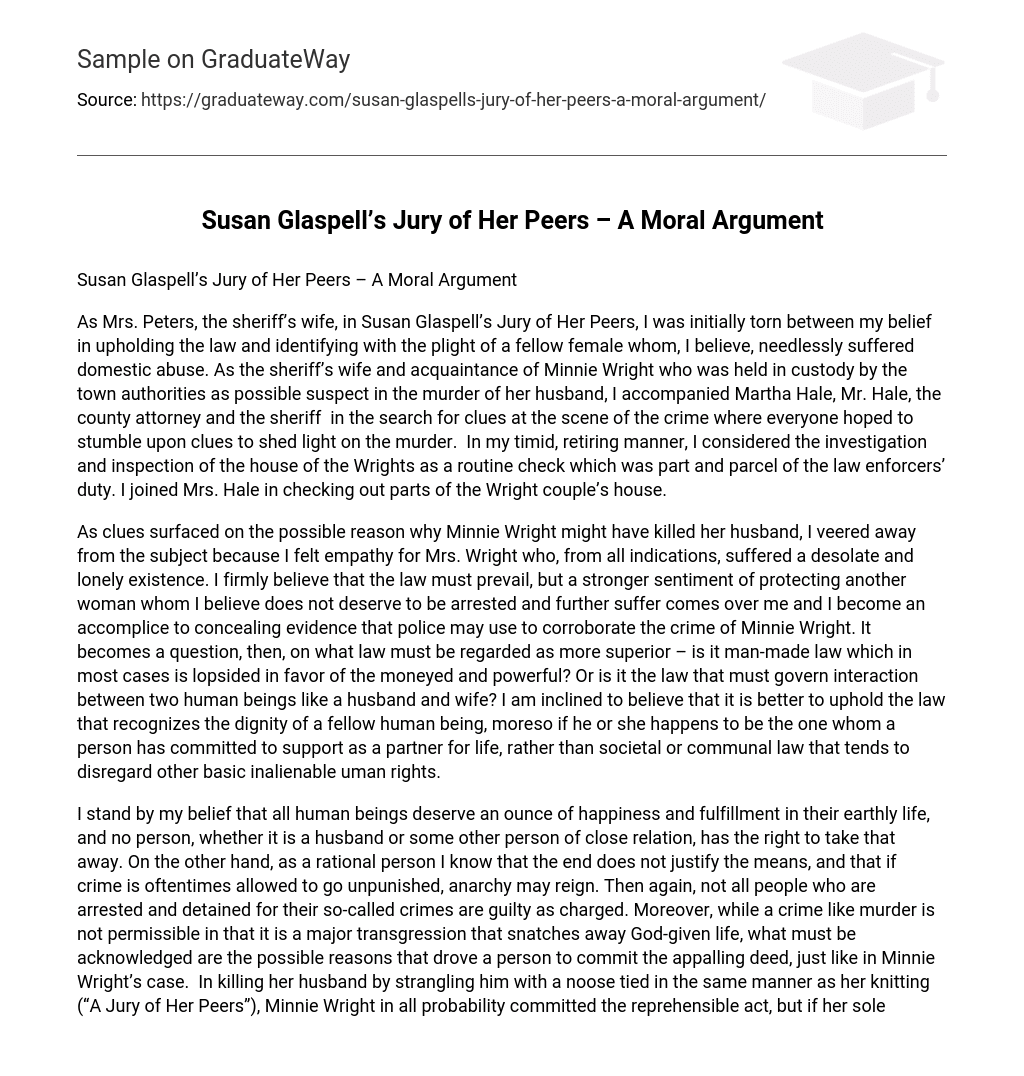As Mrs. Peters, the sheriff’s wife, in Susan Glaspell’s Jury of Her Peers, I was initially torn between my belief in upholding the law and identifying with the plight of a fellow female whom, I believe, needlessly suffered domestic abuse. As the sheriff’s wife and acquaintance of Minnie Wright who was held in custody by the town authorities as possible suspect in the murder of her husband, I accompanied Martha Hale, Mr. Hale, the county attorney and the sheriff in the search for clues at the scene of the crime where everyone hoped to stumble upon clues to shed light on the murder. In my timid, retiring manner, I considered the investigation and inspection of the house of the Wrights as a routine check which was part and parcel of the law enforcers’ duty. I joined Mrs. Hale in checking out parts of the Wright couple’s house.
As clues surfaced on the possible reason why Minnie Wright might have killed her husband, I veered away from the subject because I felt empathy for Mrs. Wright who, from all indications, suffered a desolate and lonely existence. I firmly believe that the law must prevail, but a stronger sentiment of protecting another woman whom I believe does not deserve to be arrested and further suffer comes over me and I become an accomplice to concealing evidence that police may use to corroborate the crime of Minnie Wright. It becomes a question, then, on what law must be regarded as more superior – is it man-made law which in most cases is lopsided in favor of the moneyed and powerful? Or is it the law that must govern interaction between two human beings like a husband and wife? I am inclined to believe that it is better to uphold the law that recognizes the dignity of a fellow human being, moreso if he or she happens to be the one whom a person has committed to support as a partner for life, rather than societal or communal law that tends to disregard other basic inalienable uman rights.
I stand by my belief that all human beings deserve an ounce of happiness and fulfillment in their earthly life, and no person, whether it is a husband or some other person of close relation, has the right to take that away. On the other hand, as a rational person I know that the end does not justify the means, and that if crime is oftentimes allowed to go unpunished, anarchy may reign. Then again, not all people who are arrested and detained for their so-called crimes are guilty as charged. Moreover, while a crime like murder is not permissible in that it is a major transgression that snatches away God-given life, what must be acknowledged are the possible reasons that drove a person to commit the appalling deed, just like in Minnie Wright’s case. In killing her husband by strangling him with a noose tied in the same manner as her knitting (“A Jury of Her Peers”), Minnie Wright in all probability committed the reprehensible act, but if her sole source of solace, which may have been the bird, was permanently taken away from her, she may have felt at the end of her rope and retaliated in a drastic way. It is also possible that having her rights suppressed or being made to live a shackled life might have driven Minnie Wright to near-insanity, prompting her to undertake an extreme measure.
I do not consider myself jaded, but I also realize the sad reality that, compared to people representing a bygone era who may surely have felt shock and disgust from a crime, modern-day individuals do not find it surprising anymore to see many types of crime committed, considering the many trying circumstances, such as poverty or discrimination, that perpetrators contend with.
Based on the story, it was ascertained that Minnie Wright did need help (“A Jury of Her Peers”) but it was in terms of an all-consuming loneliness that was a far cry from the vibrant and beautiful person she once was before domesticity beckoned. Portrayed as having a dull and almost lifeless existence, and considering the manner with which the men, who took charge of situations then, belittled or ridiculed women or looked down upon them as mere “housekeepers,” (“A Jury of Her Peers”) Minnie Wright’s plight represented a thousand others, with vestiges even in the contemporary milieu, who were subjected to male domination and subjugation that provoke the victims to either commit an unspeakable act or to break free from shackles to human existence, bringing to mind Henrik Ibsen’s lead character Nora in A Doll’s House.
In my somewhat uptight manner, having been used to carrying on with a wife’s duties to a husband who happened to be the town sheriff, as Mrs. Peters I fully understand and support the law enforcer’s stance that justice must be meted out for victims of a crime, and law must not be taken into one’s hands. However, there is a greater crime happening in households everywhere, which the laws of the land turn a blind eye on – and this is spousal abuse or suppression of basic rights, particularly of women who are deprived of all means to defend themselves or are stripped of their dignity. This, I think, is a great crime that begets other atrocious crimes, and it is high time people – whether it be well-meaning alliances, organizations, or individuals — do something about it.
Work Cited
“A Jury of Her Peers by Susan Glaspell.” Classic Reader. 2001. 7 August 2008 <http://www.classicreader.com/read.php/bookid.3139/sec./>.





